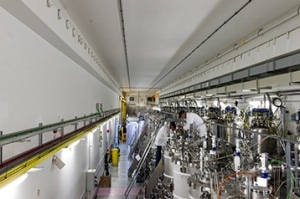Nov 4 2016
The new SPIRAL2 particle accelerator at the French large heavy-ion accelerator GANIL (CNRS/CEA), inaugurated on November 3 in the presence of the French President François Hollande, will be able to produce immensely powerful particle beams, enabling scientists to push back the frontiers of knowledge. This will double France's experimental capability in nuclear physics, especially with regard to research into atomic nuclei and the mechanisms of nuclear reactions, such as those that take place within stars. Initial experiments are expected to get underway in mid 2017.
 View of SPIRAL2's LINAC (LINear ACcelerator), with its superconducting cryomodules containing acceleration cavities. (Credit: Philippe Stroppa/CEA/CNRS Reference N°. 20160093_0020)
View of SPIRAL2's LINAC (LINear ACcelerator), with its superconducting cryomodules containing acceleration cavities. (Credit: Philippe Stroppa/CEA/CNRS Reference N°. 20160093_0020)
Studying atomic nuclei is of fundamental importance since they contain nearly the entire mass of the atoms of which all matter is made. The SPIRAL2 facility will be used to probe the very heart of matter. It is designed to produce huge quantities of 'exotic' particles (so called because they do not exist in the natural state on Earth), making it possible to carry out novel experiments in nuclear physics and astrophysics. Multidisciplinary applied research will also be carried out at SPIRAL2 in the fields of health care (radiotherapy, diagnosis and biomedical research), materials for microfiltration (membranes for the agri-food and health sectors), electronics, the aerospace industry, and nuclear fission and fusion.
SPIRAL2 is one of the world's six most important research projects in nuclear physics. When it begins operation in 2017 it will enable France to continue to take center stage in international research in this field. GANIL1, a very large-scale research infrastructure jointly run by the CNRS and the French Atomic and Alternative Energies Commission CEA, attracts over 700 researchers from 30 different countries each year to its facility in Caen.
With a cost in excess of €138 million2, the project, run by the CNRS and CEA, is supported by the French government, the city of Caen, the Caen-la-mer urban community, the département of Calvados, the Normandy region and the European Union. Construction of SPIRAL2 began in 2011, and the accelerator will be inaugurated on Thursday 3 November 2016 in the presence of the French President, François Hollande.
Its design and construction involved a large number of public research laboratories (in particular from the CEA and CNRS) as well as high-tech companies both in France and Europe.
1 Set up in 1976 by the CEA and CNRS, GANIL is the French large heavy-ion accelerator. In nuclear physics, it has already led to numerous discoveries about the structure of atomic nuclei and their thermal and mechanical properties, as well as about exotic nuclei, so called because they do not exist in the natural state.
2 To which should be added the work force provided by the CNRS and CEA, estimated at €60 million.